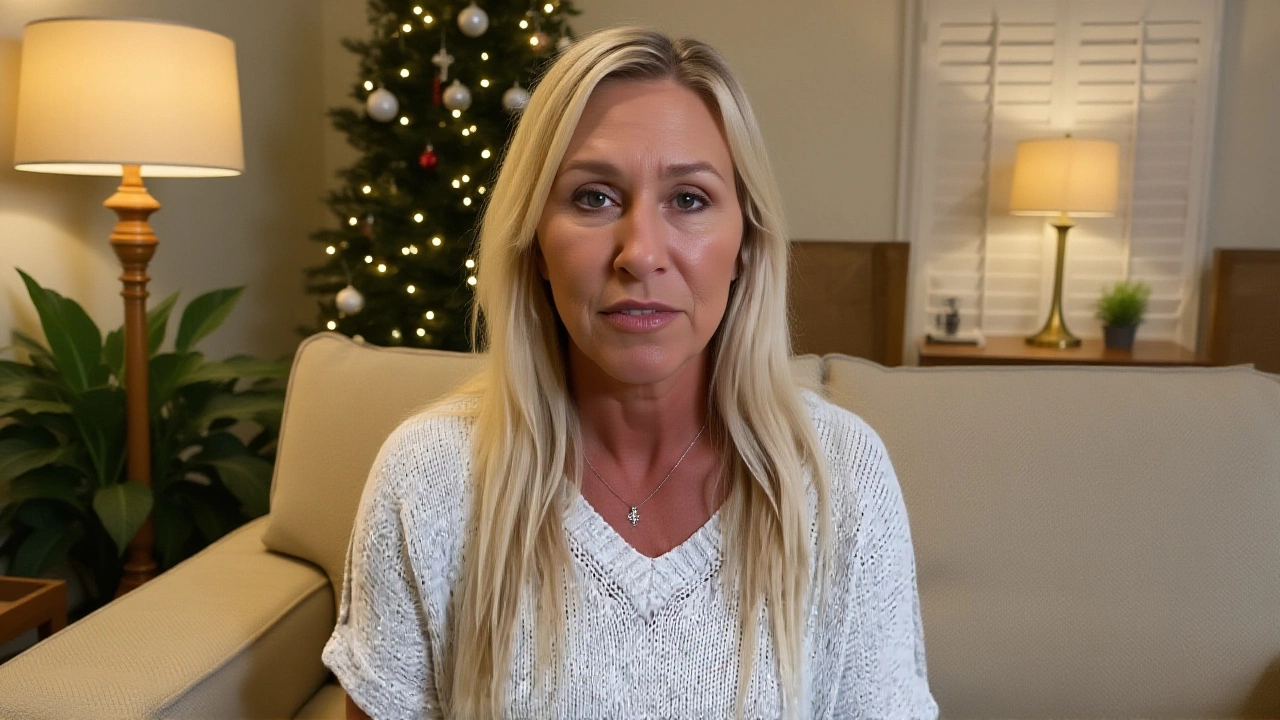When Marjorie Taylor Greene walked out of the House chamber for the last time on January 5, 2026, she didn’t just leave a seat empty—she left a political earthquake in her wake. The Georgia congresswoman announced her resignation on November 21, 2025, citing a brutal fallout with Donald J. Trump, the 45th president of the United States, who had publicly called her a "ranting lunatic" just days earlier. Her departure, effective exactly one year before the 2026 midterms, wasn’t just personal—it was a seismic rupture in the GOP’s power structure, triggered by a super PAC, a presidential snub, and a district that now faces an expensive, bitter fight to replace her.
What Broke the Alliance?
It started with a tweet. On November 14, 2025, Trump posted a blistering critique of Greene on Truth Social, calling her "wacky" and accusing her of "hurting the movement." The timing was no accident. Just days before, Trump had reversed his long-standing position on the Jeffrey Epstein files, urging Republicans to push for their release—a move Greene had publicly opposed. The tension had been simmering since July 2024, when Greene tried to unseat Speaker Mike Johnson, and intensified after she criticized GOP leadership for failing to extend Affordable Care Act tax credits set to expire December 31, 2025. "I do not want my sweet district to have to endure a hurtful and hateful primary against me by the president that we all fought for," Greene told CBS News, her voice cracking slightly during an interview recorded just hours before her announcement.Then came the knockout punch: MAGA Inc., the pro-Trump super PAC headquartered in Washington, D.C., quietly began funding a primary challenger. Greene didn’t name the candidate—yet—but she didn’t need to. The message was clear: Trump had withdrawn his shield, and the machine he built was now turning on her.
The Fallout: A District in Turmoil
Georgia’s 14th congressional district, which spans 33 counties from Rome to Dalton to Cartersville, is one of the most reliably Republican in the nation. Greene won it in 2020 with 74.7% of the vote. But her tenure was never quiet. In February 2021, the House stripped her of all committee assignments after she promoted conspiracy theories about Democratic leaders being targeted for assassination. She became a symbol—not just of Trumpism, but of its most volatile, unfiltered form.Now, her resignation forces a special election. Georgia law requires it to be held within 40 days of her departure, meaning voting must occur by February 14, 2026. Floyd County, where much of the district’s administrative infrastructure sits, could face costs between $500,000 and $750,000. That’s money that could have gone to schools, roads, or emergency services. "It’s not just politics," said one local election official in Rome, who asked not to be named. "It’s a distraction when people are already worried about inflation and crime."

Trump’s Reaction: "Great News for the Country"
Trump didn’t waste time responding. On November 22, 2025, as he left the White House for a private meeting, he told ABC News’ Rachel Scott, "I think it’s great news for the country. It’s great." Scott, a veteran political correspondent with 12 years on the beat, confirmed Trump’s tone was one of "genuine surprise and satisfaction." The former president didn’t offer condolences. He didn’t mention her service. He didn’t even acknowledge her voters.That silence spoke volumes. For years, Greene was Trump’s most loyal congressional ally—standing by him during the impeachment trials, the January 6 hearings, the legal battles. Now, he’d moved on. And he didn’t care who knew it.
What This Means for the GOP
Greene’s exit isn’t just about one seat. It’s about control. Her resignation signals that Trump’s grip on the Republican base is absolute—and that dissent, even from within his own party, will be crushed. Other Trump critics, like Representative Matt Gaetz of Florida, are now bracing for similar pressure. The party’s leadership, already fractured after Kevin McCarthy’s ouster in 2023, now faces a new dilemma: appease Trump or risk alienating the voters who turned out for him in 2020 and 2024.Meanwhile, Greene’s final message—"the common American people possess the real power over Washington"—rings hollow to many. She didn’t step down to empower voters. She stepped down because the machine she helped build turned on her. And now, the very voters she claimed to represent will be forced to pick her replacement in a race fueled by outside money, national headlines, and the ghost of a president who once called her "my favorite congresswoman."

What’s Next?
The filing deadline for candidates is December 26, 2025. Georgia Governor Brian Kemp, a Republican elected in 2018 and 2022, must issue the special election writ within seven days of the vacancy being certified by Speaker Mike Johnson. Expect at least three serious contenders: a Trump-aligned conservative backed by MAGA Inc., a moderate Republican trying to appeal to suburban voters, and possibly a write-in campaign from Greene’s own supporters.And then there’s the money. Greene has approximately $1.2 million in unspent campaign funds. She can transfer them to a leadership PAC or donate them to another candidate—but not to her own successor. That’s the rule. But the real question isn’t about money. It’s about loyalty. Who will the voters believe? The president who abandoned them? Or the congresswoman who said she’d fight for them—until she didn’t?
Frequently Asked Questions
Why did Marjorie Taylor Greene resign so close to the end of her term?
Greene resigned to avoid a costly and damaging primary challenge from a Trump-backed candidate, which she believed would fracture her district and hurt Republican chances in the 2026 midterms. She framed it as a matter of dignity, saying she wouldn’t let her district endure "a hurtful and hateful primary" against someone endorsed by the very leader she helped elect.
How will the special election affect Georgia’s 14th district?
The district, covering 33 counties and home to about 780,000 people, will face a high-cost, high-stakes race with an estimated $500,000–$750,000 in local expenses. The timing—just before the holidays—could depress turnout, while national spending may drown out local issues. Many residents are frustrated, saying they’re being used as political pawns.
What role did MAGA Inc. play in Greene’s resignation?
MAGA Inc., a pro-Trump super PAC led by Trump allies, quietly funded a primary challenger against Greene after Trump revoked his endorsement. Though it didn’t officially announce a candidate, its financial backing and messaging apparatus made clear it was orchestrating her ouster. Greene herself named MAGA Inc. as the "actor pushing her aside," confirming the group’s central role.
Is this the first time Trump has turned on a loyal ally in Congress?
No—but it’s the most public and consequential. Trump has withdrawn endorsements before, like from Rep. Liz Cheney in 2022. But Greene wasn’t just an ally; she was his most visible congressional champion, helping rally his base after January 6. Her removal signals a new level of control: even the most devoted loyalists aren’t safe if they cross him.
What happens to Greene’s campaign funds?
Greene can retain up to $1.2 million in unspent funds, but federal law prohibits transferring them directly to her successor. She may donate to a leadership PAC, another candidate’s campaign (with limits), or use them for personal expenses after repaying loans. Her future political plans remain unclear, but insiders say she’s considering a media or podcast platform to stay relevant.
Could this impact the 2026 midterm elections?
Absolutely. Greene predicted Republicans would lose the midterms, and her resignation may validate that fear. The special election in a safe GOP district could become a national referendum on Trump’s leadership. If a moderate wins, it could signal voter fatigue with Trumpism. If a hardliner wins, it reinforces his control—but at the cost of alienating suburban and independent voters.




